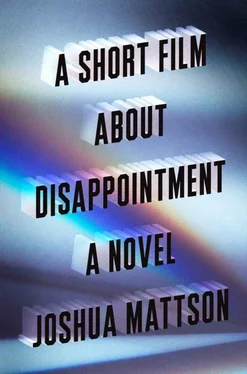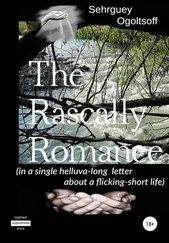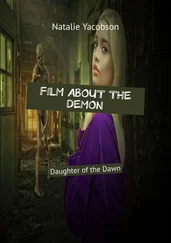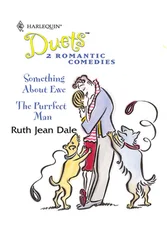I said, A film of this magnitude has to be pure.
Jonson said, I think you’ll find big ideas shrink in the dryer of the market.
I said, What a pedestrian metaphor. Mine won’t.
Jonson rented a town house for the party near the Zone.
He said, People need crannies to hide and talk. A big room is like an accusation. In a way, this party was made with you in mind. When you go in, see how many places there are for you to hide without appearing weird. A successful party is designed for the comfort of its most introverted guest.
Twenty people work for the Central Hub Slaw but a hundred fifty were in the house and yard when I arrived. Lucretia stood on the porch, looking through the front window. What was she thinking? That she was almost to another landing on the staircase to oblivion, and there she could rest? That even if she turned around, to trudge back to the surface, it was too far to be worth the effort? Her Egyptian cigarettes fogged the lawn. Her skin shone. In each shale pupil a maw of light. It was fortunate that I saw her first. I veered around the house, into the yard. If we were to come together, then we would be forced into conversation out of mutual distaste for the other partygoers.
Behind the house. A juneberry tree strung with Japanese lanterns. Alaia on a picnic table, bare-legged. The circles closest to her were well dressed and confident. Each clique, going farther from the center, was a little dumpier and slouchier, until the circles ended at the house, where I stood.
Through the house, opening cans of seltzer, leaving them on shelves. The snotty women who did the music calendar were passing around a vaporizer, tolerating three men, who wanted to bore them with stories of how it was done back in the day. Two boasted. The cunning one was questioning the youngest intern about procedurally generated music. Rich, one of the restaurant critics, sat in a recliner, his shoes forgotten in the yard. He stroked a vain black cat. Rich’s stories were the worst. Even Jonson couldn’t bear his anecdotes of this or that dish, retrograde gastronomy, the charming guest neighborhoods he spent his Saturday afternoons eating in without making eye contact.
Simmons, the political reporter, mixed drinks. She does not appear to hold any strong convictions but enjoys the narcosis of political reportage. The employees of the paper have nice lives, messy lives. Animals to return to, animals to eat. Even I can not say my life is not comfortable. Threadbare but comfortable.
The upstairs and main floor bathrooms were occupied, but I managed to find an en suite in the second basement. I drew a bath. On the toilet, I watched the water steam. A mystery for someone to find. People were exploring the house. Two men went into a closet. Laughter and rustling.
Outside. Because the party increased my social pain, I felt willing to be lectured by Lucretia. She was gone. Dangling from the tree, lanterns shaped like gourds. How awful. Mel, who sold ads for the newspaper and liked to talk about the trivia league she organized, asked who I knew at the party that worked at the paper.
I said, I’m Alaia’s substance abuse counselor.
She went around the corner. I wasn’t surprised she didn’t remember me. I am, as they say, nondescript. Even my initials, N.B., lack the dash of an H.V.J., Jonson’s, or a J.O., Osvald’s, who has no middle name. Like me. Two names are enough. No need to be greedy.
A bugless night. I was glad I came but I could not say why.
Through the window Jonson stood with Marie, the marketing manager. His hand on her back. Jonson’s eyes were glassy. He was one drink from a lawsuit. Marie was a year or so out of Bast. A pile of books on her nightstand she did not have time to read. He seemed to be fooling her, but maybe she was the sort of person who was generous enough to offer the benefit of the doubt to buffoons. Proud to say she worked in media. Someone who knew where to go at two a.m. on a Tuesday night. Nobody but Alaia and I knew Jonson owned the paper. Maybe three or four of Alaia’s pets, which would mean everybody knew. He didn’t want to be treated any different. I went inside.
I said, Jonson, your wife wanted you to meet her at the place around the corner for a sandwich when you’re done here. She went there to get some reading done. She also said remember not to drink too much because you know what happens. Marie, can you help me for a second? I was wondering how to access the film reviews on my Pinger. I am quite stupid and can never get them to load.
DIR. LOGAN BRODER
81 MINUTES
This remake of Hans Rayjan’s classic takes from the original only its premise that humans receive a signal, assumed to be sentient in origin, from distant star Ceta 44. Rayjan’s film is confined to a conference center where flunkies, lickspittles, men Friday, assistant assistants, sycophants, doormats, and kiss-asses maneuver to set the terms of contact with extraterrestrials.
Mr. Balanbalan, head of the Romanian Space Agency, argues his city should host the antenna to broadcast a signal back at Ceta 44, because Bucharest has “the bravest rocket comrades.” Dr. Tereshkova challenges June Ballou to a fistfight over the last blondie. Professor Rawls imitates his peers on prank calls to their spouses after a few drinks. At the conclusion of Rayjan’s film, the countries decide not to send a signal to the aliens, because they can’t agree on an equitable way to share the credit. It is a girl in her garage with a science-fair radio antenna who sends the message, Don’t Bother .
The remake dispenses with the comedy in favor of an oatmeal of choral music and watery humanism. Monuments are disrespected with frequency. I will no longer be able to visit a museum or a bridge without imagining it being obliterated by a laser beam.
Broder is among our worst directors and our most profitable. I sort of admire his financial sense, for working in the blockbuster milieu, for making the numbers work, long after their time has passed. One can’t help but root for the ambitious.
Jonson hosts a dinner on the last day of each month celebrating Old Europe. One night last spring, the theme was Portugal. Salt cod, a snowy wedge of Graciosa, cloying vinho verde , an incorrect but uncorrected reference to El Greco, and a flat anecdote of a missed connection in Lisbon circulated the room.
As a general rule, I have abandoned male conversation. I’ve heard enough about the virtues of weight lifting, yardage, beer, games, difficult books. When a man speaks to me, my instinct is to extricate myself.
Killing time with the aperitif, in Jonson’s study. A tall, beautiful man approached me near Jonson’s collection of stuffed thylacines, where I was arranging a tryst between two of the rougher specimens and a fertility icon Lucretia had bought, probably from a bent curator. The beautiful man’s money was in his shoes. The shoes were too good. They went well past genteel prosperity into vulgarity or parody. He had the slouch common among the arrogant, the fake guy-on-the-street, trying to convey a state of relaxation, which somehow manages to be insouciant and insulting at the same time. Such persons conflate success with character.
He said, Jonson pointed you out. You’re that other critic?
I said, Yes.
He said, I’m Rolf.
I said, Hi, Ralph.
Rolf said, Rolf Millings, of the Upper Lake Shore Drive Millingses.
First I told him my name was Daniel Chivo. Then I said it was Jarvis Fillingswimble. After a pause for no laughter I gave him my real name, Noah Body.
Rolf said, What do you think of Broder? He’s my favorite.
I said, I think he’s a fraternity hack, Raul. The proprietor of a nonunion circus. A fracker of cinema for its crudest lessons.
Читать дальше












